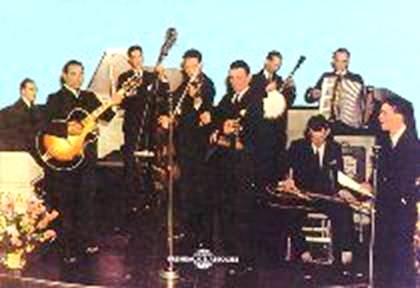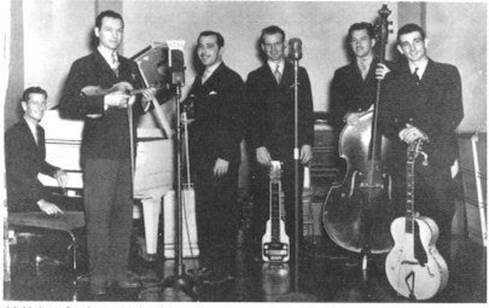Western Swing Personalities-Adolph Hofner
By
Leocthasme
Historical Western Swing
Historical
Western Swing
In the many issues of Pencilstubs, I have tried to continue my numerous articles on the history of Western Swing.
Numerous comments have been received directly by me and many more have appeared below the several articles I have written since the October Issue of 2000. There are
still comments being made on the original article because it is referenced any time someone just looks for Western Swing by
typing just those two words into a search engine. Well, let’s face It, I love the referrals, and now just thinking of that, I feel I should continue to add all the information I can
find on an interesting subject, from all sources beside all the information I have accumulated over the years from clippings and the backs of old record covers.
Here is another article on a very interesting person
who did so much for
Western Swing
leocthasme
Adolph
Hofner: Born June
8, 1916, Moulton,
TX.
Died
June 2, 2000 San Antonio, TX
Adolph
Hofner and His San Antonians
Adolph was still playing
and wowing audiences in San Antonio, TX, almost to the day of his demise, although his health had deteriorated somewhat Hofner became, in his own words, "a confirmed Hillbilly" after listening to Milton Brown and His Brownies and he continued the Western Swing tradition for over 50 years.
The
original San Antonians consisted of Adolph's brother Emil;
Leonard Seago (formerly with the Tune Wranglers); Bert Ferguson, and Floyd Tillman, who later became a well known songwriter.
During WWII, as with the other bands, some of his best men went into the Armed Forces.
Still Hofner was able to find such replacements as former Tune
Wrangler Eddie Duncan and Leonard Brown. He also began adding Brass players (fiddlers were becoming scarce).
In
1945, when WWII had ended, Hofner moved to California where the
band was employed on the Foreman Phillips Country Barn dances for two
consecutive years. It was during this period that the band recorded their hit tunes "Sagebrush Shuffle" and "Alamo Rag" for the Columbia Label.
In
1949, the band returned to San Antonia, TX where they were employed by the Pearl Beer Company, and called The Pearl Wranglers, who at one time used both of Adolph's daughters as singers and drummers.
During
his long and illustrious career, at one time or another, he was
called "The Dean of Country Bandleaders," "The King of South
Texas Swing", "The Sultan of Swing", and "The Prince of Polka". Once,
he was even billed as the "Bing Crosby of Country".
Some combinations seem quite improbable. Who
could have predicted that Lisa Marie Presley would ever marry Michael Jackson?
Or that Pat Boone would release a heavy metal record album? And who
would imagine that a mixture of Bohemian dance music, '30s style swing, polka tunes, and country hoedown rhythms, with a touch of Hawaiian influence, could provide the basis for a successful career? Well,
we don't have to imagine it, because a man named Adolph Hofner
once conceived of that very thing and executed it so successfully that he remained popular in South Texas for more than 50 years. Outside of Texas he is best remembered, as a pioneer of "Western Swing."
Adolph Hofner was born into the Texas
Czech-German community and recorded not only hot Western Swing,
but also mellow "heart songs" as well as old Czech polkas and
waltzes, many actually sung in Czech! Over the years his smooth vocals led to a sometimes billing as the "Bing Crosby of Country”. But Hofner was so versatile that at one time or another, he has also been called "The Dean of Country Bandleaders", "The Sultan of Swing", "The Prince of Polka", and "The King of South Texas Swing".
Who is this man who inspired
such an
enthusiastic following?
Adolph Hofner was born in Moulton, Texas, a
small Czech community in Lavaca County between Houston and San
Antonio. His mother was Czech, his father German/Czech. Czech was his first language, and polka music the sound of his youth. As a boy he attended Bohemian dance halls and listened to "oom-pah" bands.
The Hofner family moved to San Antonio when Adolph was
10 years old. Thereafter he was exposed to many different styles of
music, among them the recordings of Hawaiian string groups who, after
experiencing a short-lived wave of popularity in the late '20s and early '30s, left the steel guitar as a legacy to country, bluegrass, and rock 'n roll music. Hofner said: "That's
what got me started on string, Hawaiian guitars."
Adolph
and his younger brother Emil both learned to play stringed
instruments at an early age, starting when they ordered a ukulele from a catalog. When the mailman delivered it, "We like to broke the ukulele before we got it into the house fighting over it." By the early 1930's Adolph and Emil were taking guitar lessons. Adolph learned the guitar, while Emil concentrated on the steel guitar. Hofner listened avidly to such artists as Jimmie Rodgers, Bing Crosby, and Russ Colombo -- even Rudy Vallee.
Then he heard Milton Brown and his Brownies. "Now that's what sold
me on western music --because they had a band."
The
Hofner brothers played in San Antonio clubs
when and where they could. Adolph can remember playing at
an outdoor dance for the princely sum of 50 cents. Eventually, the
brothers teamed up with a fellow named Simon Garcia; forming a trio they called
"The Hawaiian Serenaders." It
was with Simon Garcia that Adolph learned "Maria Elena," later to
become a big recording hit for him.
After a time the group landed a 15-minute
Sunday radio spot on KTSA. The boys were only half way
into the program when the radio station cut them off the air. Adolph was so disgusted that he almost gave up the music business.
Elsewhere in San Antonio, a man named Jimmie
Revard had been fronting a little combo and was looking to put
together a professional group. Revard heard the Hofner brothers at
the Monte Carlo Inn and was taken by Emil and his steel guitar work. The boys were still teenagers, so Revard hired Adolph as well, being afraid that the younger brother wouldn't come along otherwise. The group took the name "Oklahoma Playboys" to distinguish themselves from “Bob Wills and His Texas
Playboys”.
 The
Hofners first recorded with Jimmie Revard and his Oklahoma
Playboys at the Texas Hotel in San Antonio on October 22, 1936. That's Adolph in the color picture
with his guitar in the center of the Jimmie Revard group. Brother Emil is shown seated with the guitar across his lap. Jimmie Revard is second from the left. The
Hofners first recorded with Jimmie Revard and his Oklahoma
Playboys at the Texas Hotel in San Antonio on October 22, 1936. That's Adolph in the color picture
with his guitar in the center of the Jimmie Revard group. Brother Emil is shown seated with the guitar across his lap. Jimmie Revard is second from the left.
At one time the "Oklahoma Playboys"
actually relocated to Oklahoma, but the Hofners ultimately left
the group to return to San Antonio. Again Adolph considered giving up
music. He accepted a position as a mechanic in San Antonio, but this job lasted only three weeks. He didn't much care for the work and missed playing his music. In
the late '30s Hofner went to work for Tom Dickey and “The Showboys”, with whom he recorded "It Makes No Difference Now," a tune, with Adolph's vocal, that led to a rise in his popularity. The Showboys
had a little radio spot and Hofner was fired from the group for being late to the studio one day. Thereafter, forming his own group and being his own boss seemed like the thing to do.
By 1938 "Adolph Hofner and
All the Boys" were performing around San Antonio and other parts
of South Texas. The ‘Boys’ entered the recording studio on October 25, 1938, under the name "Texans" so that the record-buying public would know where they were from. When it turned out that someone had a copyright on that name, the group changed its name to "Adolph Hofner and His San Antonians".
A recording session on February 13, 1940 produced Hofner's recording of "Maria Elena," a big enough hit to insure a successful career. In 1941, another session produced "Cotton-Eyed Joe," Hofner's
version of which was something of a national hit; indeed, he may have been the first ever to record the tune.
As with many other groups, the personnel
changed over the years. The group (shown below) that recorded at least 7 numbers at the February 13, 1940, session included:

·
Adolph Hofner -- Guitar and Vocals
·
Emil Hofner -- Steel Guitar
·
Leonard Seago -- Fiddle
·
Johnny Reeves -- Fiddle and Drums
·
Bert Ferguson -- Piano
·
Buck Wheeler -- Bass
Hofner remained regionally popular throughout
the 1940s and 50s. During World War II the similarity of his name to
Adolph Hitler caused the sort of discomfort that can easily be
imagined. But performing as "Dolph" Hofner & the San Antonians
he enjoyed a few good years playing for Foreman Phillips out in California.
In the 1950s the band came under the sponsorship of the
Pearl Beer company and the "Boys"/"Texans"/"San Antonians"
became the "Pearl Wranglers."
Over the years Adolph and his
boys recorded for many labels, including Imperial, Columbia, RCA, Decca, and Sarg. The repertoire included not only Western Swing, but also a wide variety of other popular styles and themes. With all due respect to Bob Wills, Adolph Hofner can also lay claim to a share of the credit for pioneering and spreading the popularity of Western Swing from Texas to California and around the world.
A changing marketplace and age forced Adolph
Hofner to slow down in his last years, but he also begun
receiving increased recognition for his accomplishments.
Among the honors and awards bestowed to date:
·
Member of Country Music Hall of Fame --Nashville
·
Recipient of the Encore Award--Texas Music
Association
·
Member of Texas Western Swing Hall of Fame
·
Member of Texas Polka Music Association Hall of
Fame
·
Member of Washington Western Swing Hall of Fame
·
Member of Country Music Association of Texas
Hall of Fame
·
Recipient of Western Swing Society Hall of Fame
award
·
Song "Green Meadow Waltz"-- Library of
Congress
In his final years, Mr. Hofner was sought after
for interviews by college professors, students, and authors, as
well as TV and radio personalities, all seeking to get a first-hand story from a country music legend. Adolph Hofner died on June 2, 2000, at his home in San Antonio, Texas, just a few days short of his 84th birthday.
|